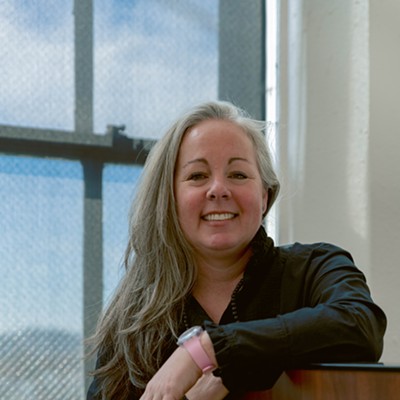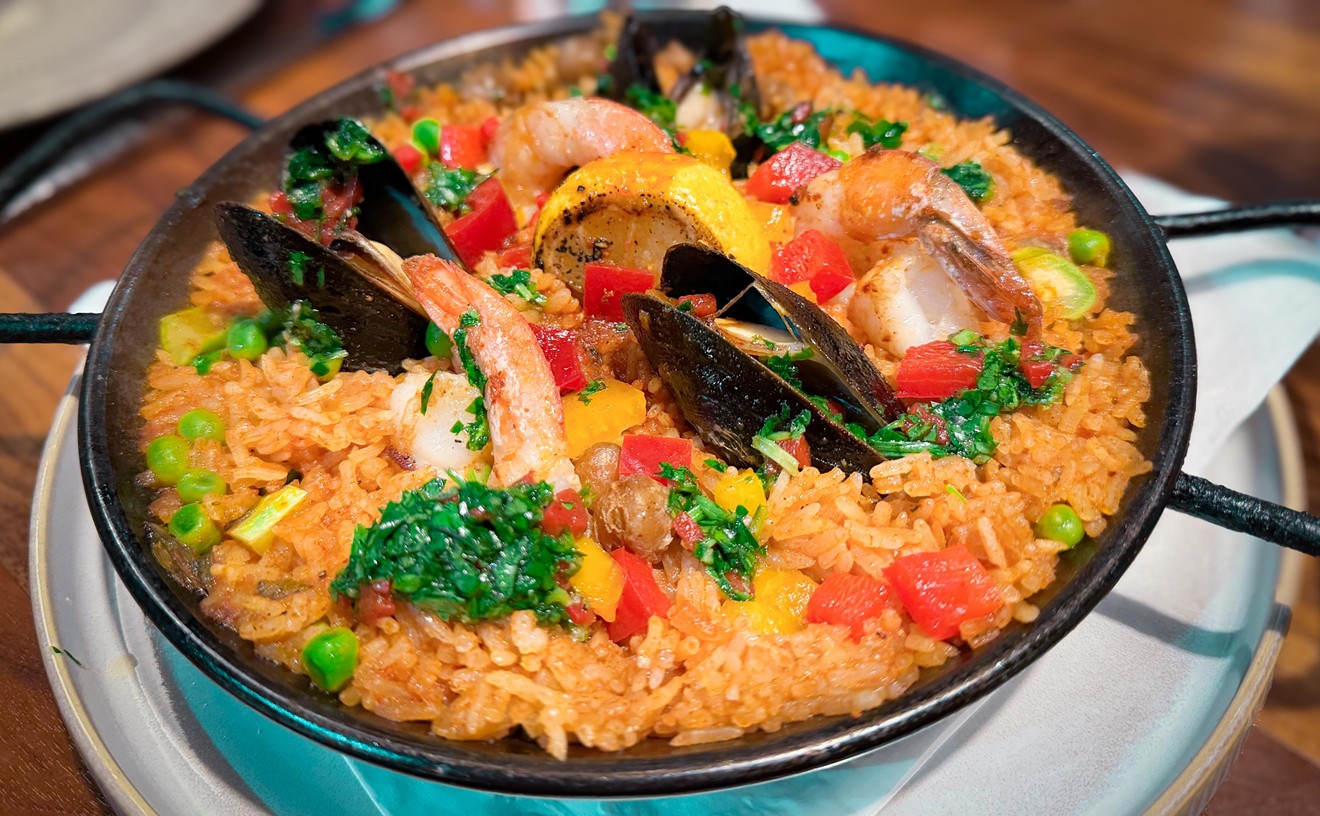Yaser Khalaf, owner of Medina and Baboush in the West Village, traveled throughout the Middle East and Europe as a child. Then in college, he traversed America, Route 66-style, in a van in which he literally blew the engine. His life-long passion for food, culture and people helped mold him into a successful restaurateur. He's naturally good with people and tells great stories, but in terms of the business side of things, everything he is now, he learned in Lexington, Kentucky. Yes, Lexington.
Where are you from? I was born in Kuwait City to a Palestinian family. I lived there until I was 15 years old and was fortunate enough to travel everywhere while growing up: Tunisia, Nigeria, Egypt, Lebanon, Greece, Spain, Italy, Southern France.
How did you wind up in Dallas? Well, I wound up in Lexington, Kentucky first.
How did you wind up in Lexington? I went to the University of Kentucky to study accounting.
How was that transition -- world traveler to a city in Kentucky? It was very boring. It's a small town and I liked the people a lot; they're very nice. I like the southern hospitality there -- how they open the doors and say thank you all the time. It was just a slower pace of life.
Was that your first exposure to America? Well, when I arrived I was in New York City for a few days, but then I went to Kentucky. All my friends kept telling me, "You haven't seen America yet!" And so I travelled all over the U.S. whenever I could. Every break, I would just drive. I drove completely across the country.
Where did you go? A friend and I started in Boston, then Chicago, Salt Lake City, San Francisco, L.A., then to Las Vegas and the Grand Canyon. And that was just the first trip. We literally burned up the engine in the van. Literally burned it. Other times we went down to Miami and up to New York often. I learned so much about culture and food.
After all those road trips, what's your favorite city? I love New York City so much. It's so romantic, especially at Christmas time. I love the snow, the smoke everywhere. I love the people's accents. When I got there I felt like I was a New Yorker at heart.
When I travel I also like to try the food everywhere. When I would eat somewhere, I wouldn't order just one thing, I'd order 15. I wanted to try it all. When did you first become really interested in food? Growing up, my mom always cooked a big breakfast and lunch for us. In the Middle East we eat different than here. There we eat the big meal at lunch. Dinner was just a snack. So every night my dad would take my brother and I out to give my mom some peace. We would walk around Kuwait City and often have the street food. I loved it.
What was your favorite street food? Shawarma. It's just amazing.
Did you ever help your mom cook? A little, but should would kick me out of the kitchen. It was tradition. She didn't want me in there, but I would sneak in and try things.
When you traveled, what became your favorite food? Italian. Particularly in the south, like Sicily. The flavors there reminded me of where I was from -- a lot of lemon juice and garlic. I don't really like butter, cream and all the heavy stuff. I like the clean, pure ingredients.
So, back to Kentucky. You were studying accounting. How did you get into the restaurant business? A classmate of mine from Syria said one day, "Hey, I worked in a restaurant and it's fun and everything. Let's open a restaurant."
When was this? About 1990. It was my second year in college and I said, "You're kidding me, right?"
What kind of place was it? Pizza and Italian food, but I told him, "We'll do it with a Middle Eastern twist. We'll do pizzas with feta cheese, cucumbers and stuff. But, we won't tell people it's 'Mideast.' We'll call it Greek or something like that."
With a lack of any knowledge on how to run a restaurant, you open a clandestine Middle Eastern-inspired pizza and Italian place in Lexington, Kentucky. How did it go? Well, we opened, then in the middle of the deal my friend decides he wants to go back to Washington D.C. to finish his master's degree. And he said, "Ah, you can manage it. You'll be fine."
So, I took all of my classes early in the morning, and then would run to the restaurant to help. I worked literally six months from open to close without a single holiday or anything. It ruined my life. I couldn't travel anymore. I kept up my studies, but I was exhausted.
Was the restaurant any good? Yeah, we actually did really well. Had a good lunch crowd. For college kids, we were bringing in good money, but I didn't know how to handle the money and that was very frustrating for me. I wasn't good at the business side.
The mayor of Lexington came to eat at our restaurant the first day it opened and I served her frozen lasagna. My friend told me that even though we made the lasagna from scratch we should freeze it. And I didn't know any better, so I did it. I had no clue. Then we'd hire people to help us and they all had their own ideas, too. Which is my first lesson about restaurants ... Rule No. 1 of restaurant ownership? Never trust anybody. Trust your own instincts. The vision of a restaurant has to be the owners. Everyone else will have their own way of doing it -- something totally different.
Because the owners drive the passion for a place? Exactly. You know many people call themselves restaurateurs but they have no passion. Actually, forget passion. You just have to care. It's all about caring.
Back to Lexington ... What happened? I really wanted to learn and know more. I started inquiring about different things. I even went to Louisville and met this wonderful Jewish guy. We had nothing in common but food, but he taught me a lot. He told me that the restaurant business is not about what I like. It's about serving consistent food to people. He had me cut the menu way down because my friend put things like burgers on the menu and that was exhausting. So he told me to focus on two pastas and five pizzas. That's it.
Did it work? It was just too late. I was too exhausted by it all. After six months I shut it down. I just locked it one day. I had to focus on school and I needed to learn the business better. I told my friend that he had to come down and help me or I'm locking it up. I was tired and had to finish school.
But you put so much into it ... Yes, and we started to make really good food, too. People would tell me, "This is really good; now if you can only make it consistently." And that's my second lesson.
Lesson two? Consistency. Serve crap, but serve the same crap every day.
You laugh, but it's true. Look at McDonald's! You can serve bad food, but serve the same bad food every day. After earning your accounting degree, where did you go? Well, my cousin's friend worked at a great Italian-Sicilian place in New York, so every summer I would go there and learn how to cook.
Accounting was out the window then, huh? Yes, because it just wasn't me. I couldn't sit all day in an office and look at numbers. I need people. I like to visit with people.
How did you get to Dallas? I finished school and opened a couple of restaurants in Lexington. But then I met my wife and she was in Dallas, so I moved here.
I first opened LA Gourmet Pizza on McKinney (then sold it two years ago). My second restaurant was Medina with my partner Sam, and that's where I got introduced to Moroccan food. I loved the art of balancing all of those flavors. That's always been amazing to me. How to get them to all taste good together.
What do you think about the Dallas food scene? It's changing. It's very acceptable to new cultures and type of foods. The people here enjoy trying different things.
Where do you eat when you go out? My wife, son and I like to try all the new places that open. Then, we have a game. Afterward we all ask, "Would we come back here?" Then we all vote. So we like trying new places, but my wife also cooks a lot, and she's an amazing cook, so we eat at home a lot.
Do you have many rules for the kitchen here at Baboush? Rules? This many (arms spread open wide). We have an entire sheet everyone has to sign. I don't care what they learned before, they have to know the rules here.
You designed the menu and have created most of the recipes, but you don't actually cook. So, what do you look for in a chef? They have to have the basic skills. Not necessarily have had to go to school, but they have to know how to cut. I can give them a bunch of parsley and I can see if they care or not. It's that simple. If they take the stems out, I like them. If they don't, they need more training.
I also look at cleanliness. That's very important to me. Everything has to be really clean, from the front of the house to the restrooms and especially in the kitchen. It tells a lot about who you are. I even look at everyone's fingernails in the mornings. It really frustrates some people, but I don't care.
Are you hard to work for? Yes. Very.
Is that okay? Yes, it's 100% okay. Because I take care of my customers.











